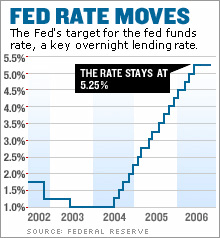Economic growth faster than thoughtThird-quarter GDP revised up to 2.2 percent growth rate, topping forecasts, inflation gauge dips.NEW YORK (CNNMoney.com) -- The economy grew at a much faster pace in the third quarter than originally estimated but a key measure of inflation dipped, the government said Wednesday in a report that economists and Wall Street both welcomed. Gross domestic product, the broadest measure of the nation's economic activity, grew at a 2.2 percent annual rate in the quarter, up from the 1.6 percent rate the government estimated a month ago. Economists surveyed by Briefing.com had forecast a revision up to 1.8 percent.
The report's key inflation measure, the so-called core PCE deflator, which measures prices paid by consumers for goods other than food and energy, rose at a 2.2 percent annual rate, down from the 2.3 percent rise originally reported, suggesting that faster growth can take place without increased price pressures. The numbers, as well as other recent reports on housing, manufacturing and other parts of the economy, are being watched especially closely for signals about what the Federal Reserve might do next with interest rates. There's a widespread belief on Wall Street that a slowing economy could lead the Fed to cut rates sometime early next year. But Fed Chairman Ben Bernanke painted a relatively healthy picture of the economy in a speech Tuesday, and highlighted the risk of a "worrisome" pickup in inflation. That led some economists to say the Fed's next move might be to raise rates rather than cutting them. The Fed has held rates steady since June. Anthony Chan, chief economist for JPMorgan Private Client Services, said the stronger growth in the GDP report isn't likely to raise inflation concerns. Part of the upward revision is due to a smaller trade deficit, which was due to lower prices for imported oil. The gap between imports and exports subtracts from GDP. Another part of the revision was due to a buildup in inventories. "I love this report," he said. "It doesn't have anything that would spook central bankers. It has all the ingredients of best of all possible worlds." At the same time, the report doesn't point towards the Fed having to cut rates to prop up a slowing economy, even if spending by consumers slowed a bit in the latest GDP reading. Consumer spending grew at a 2.9 percent rate in the quarter, down from the 3.1 percent previously estimated. "This kind of cools the talk that the economy is edging closer to the brink of recession," Chris Rupkey, senior financial economist at Bank of Tokyo-Mitsubishi, told Reuters. |
|



